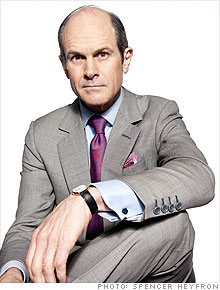Search News
FORTUNE -- "We're thinking of pulling out of Brazil," the CEO of a large American corporation told me a week ago. The company has been operating there for a few years, doing several million dollars of business. The problem? A series of court judgments so inexplicable, and so crushingly expensive, that the CEO doubts his ability to manage the business. He doesn't see how the rulings can be honest -- even former President Luiz Lula da Silva called Brazil's judiciary a "black box" that's "untouchable" -- and if the system doesn't work, this CEO is bailing out.
This is corruption, a problem we'd rather not think about that now threatens the ascension of developing countries into the top tier of world economies. Given its history, optimism on the subject would be foolish. But while the media and Wall Street focus on more tractable issues like inflation and exchange rates, world leaders seem perfectly clear on the greatest threat to the future of the BRICs and other emerging economies. Corruption is the "biggest threat to China," Premier Wen Jiabao told the National People's Congress in March. When U.S. Vice President Joe Biden visited Russia recently, he cited corruption as the No. 1 impediment to better economic relations and pointedly mentioned Sergei Magnitsky, a lawyer who died in custody in 2009 after accusing the police of corruption.

The problem is not just the petty palm greasing that's common worldwide, though that has its own corrosive effects. Developing-market corruption has reached staggering dimensions. India's telecom ministry apparently siphoned $30 billion from various projects over the past few years. A Russian activist posted online documents apparently showing a $4 billion fraud in a state-run company's trans-Siberian pipeline project. In China a minister overseeing the new high-speed-rail network is accused of skimming $152 million (and maintaining 18 mistresses). The threat is broader than it may seem: Corruption discourages the investments needed for economic progress. In India "high-level corruption and scams are now threatening to derail the country's credibility and [its] economic boom," says a report from KPMG.
The societal effects are subtler and arguably worse. Initiative and ambition shrivel: Why try hard when effort isn't the source of success? Respect for authority evaporates. Anger and resentment build, especially as a society becomes richer and the gulf between ordinary citizens and the officially tolerated crooks grows wider. When Premier Wen declared corruption the biggest threat to China, he wasn't talking about its effect on foreign investors; he's worried about "social stability." He knows that while massive corruption isn't the only grievance of the revolutionaries in North Africa and the Middle East, it's a big one.
Many people shrug at corruption because they figure it's eternal and incurable. Not so. England was deeply corrupt in the 17th century, Sweden in the 19th, notes professor Michael Johnston of Colgate University, a corruption expert. Singapore and Hong Kong virtually eradicated corruption in a generation. Still, reform is extraordinarily hard, he says, especially in big economies where "huge stakes are on the table." Reform "can degenerate into political payback" by the reformers. Where to begin? "One of the best predictors of whether a society will do well on corruption is the strength of property rights," Johnston says. "That's not a bad place to start."
An insidious feature of corruption is that it's hard to talk about. I can't identify the CEO who's thinking of leaving Brazil because doing so could imperil his company's ability to operate there. More generally, accusing people in power is inherently dangerous. Graft operates in the dark. So, like the man looking for his keys under a lamppost not because he lost them there but because the light is better, we focus on economic issues that are rich with statistics and susceptible to math. But we're missing a giant danger. It's naive to think the recent official attention to corruption will amount to much. If it doesn't, the progress of the emerging economies could turn ugly. ![]()



| Overnight Avg Rate | Latest | Change | Last Week |
|---|---|---|---|
| 30 yr fixed | 3.80% | 3.88% | |
| 15 yr fixed | 3.20% | 3.23% | |
| 5/1 ARM | 3.84% | 3.88% | |
| 30 yr refi | 3.82% | 3.93% | |
| 15 yr refi | 3.20% | 3.23% |
Today's featured rates:



| Company | Price | Change | % Change |
|---|---|---|---|
| Ford Motor Co | 8.29 | 0.05 | 0.61% |
| Advanced Micro Devic... | 54.59 | 0.70 | 1.30% |
| Cisco Systems Inc | 47.49 | -2.44 | -4.89% |
| General Electric Co | 13.00 | -0.16 | -1.22% |
| Kraft Heinz Co | 27.84 | -2.20 | -7.32% |
| Index | Last | Change | % Change |
|---|---|---|---|
| Dow | 32,627.97 | -234.33 | -0.71% |
| Nasdaq | 13,215.24 | 99.07 | 0.76% |
| S&P 500 | 3,913.10 | -2.36 | -0.06% |
| Treasuries | 1.73 | 0.00 | 0.12% |
|
Bankrupt toy retailer tells bankruptcy court it is looking at possibly reviving the Toys 'R' Us and Babies 'R' Us brands. More |
Land O'Lakes CEO Beth Ford charts her career path, from her first job to becoming the first openly gay CEO at a Fortune 500 company in an interview with CNN's Boss Files. More |
Honda and General Motors are creating a new generation of fully autonomous vehicles. More |
In 1998, Ntsiki Biyela won a scholarship to study wine making. Now she's about to launch her own brand. More |
Whether you hedge inflation or look for a return that outpaces inflation, here's how to prepare. More |